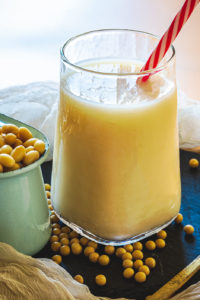Is Soy Milk Good For Lactose Intolerance?
Around 30 to 50 million people in the US are lactose intolerant. Being lactose intolerant can have a dramatic impact on one’s diet. Thankfully, there are alternatives for dairy, with soy milk being one of the most popular. So is soy milk good for lactose intolerance?
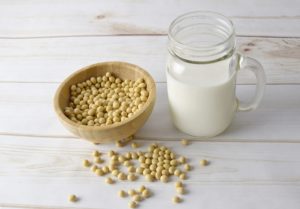
Soy milk and other plant-based milk products may be getting popular because of being vegan, but they have always been a lifeline for lactose intolerant individuals. While it’s different from cow milk in many ways, it can serve as a great alternative.
There are just so many things we use milk for, like coffee, tea, smoothies, cereal, and baking. Imagine how selective you’d have to be if you can’t consume the core ingredient of all these things.
Soy milk is not merely an alternative for milk, it’s also a much healthier option. But first, let’s talk about lactose intolerance a bit.
What is Lactose Intolerance?
Lactose intolerance is a digestive issue where the body doesn’t break down or digest lactose. Lactose is a kind of sugar present in milk and other dairy products like butter, cheese, and cream.
To break down this sugar, our bodies normally produce an enzyme called lactase. People who are lactose intolerant don’t produce nearly enough to break down the main carbohydrate in milk.
When lactose goes through the digestive tract without being broken down into its two sugar components, it can cause digestive issues. This can lead to symptoms like bloating, diarrhea, flatulence, stomach cramps, or just generally feeling sick.
When such individuals consume dairy, they may see the reaction very fast. They can get bloated or gassy and may need to use the restroom urgently. This is why it’s important for a lactose intolerant person to ensure that whatever you’re consuming doesn’t contain any dairy.
Causes of Lactose Intolerance
It’s not totally clear as to why some people are lactose intolerant and others not. However, most research and evidence points to this being a genetic problem.
Interestingly, a Cornell University study found that lactose intolerance may be linked to ancestors who didn’t live or farmed with healthy cattle. The study points that those with European ancestors have developed the ability to digest lactose over the centuries, as their ancestors raised cattle herds healthily and consumed their milk.
In contrast, people with Asian or African heritage are largely lactose intolerant because their ancestors didn’t grow up with healthy cattle. It also found that lactose intolerance increased with temperatures, with people in hotter countries being more intolerant than those in colder regions.
As such, there are two types of lactose intolerance, differentiated by their causes:
- Primary Lactose Intolerance: This is the most common type, which is mainly genetic.
- Secondary Lactose Intolerance: This result from another illness, particularly a digestive disease like gut inflammation or celiac disease (gluten intolerance).
Possible Treatments
Most lactose-intolerant people simply avoid dairy products altogether to avoid digestive issues. However, there are possible treatments or solutions one can try. That said, the research into these possible treatments has been minimum and inconclusive.
One of the common solutions for being able to drink milk is to supplement the enzyme lactase. There are supplements in the form of tablets and drops that you can add to your food or eat separately.
It may or may not work for you, as most studies have shown that the effects of supplementing the lactose digesting enzyme vary from person to person.
Another possible solution is to expose yourself to lactose repeatedly. However, for someone very sensitive to lactose, this can be a nightmare.
A Journal of Dairy Science study found that pro and prebiotics may help with the digestion of lactose in milk.
Is Soy Milk Good for Lactose Intolerance?
As a lactose intolerant person, your best bet is to rely on a milk alternative like soy milk.
Soy milk didn’t just come out of necessity for lactose intolerance people; it’s actually been around for a very long time.
In Asian cultures, soy milk has been the de facto milk for food and beverages for ages. So it’s not really a new concept.
More importantly, the understanding of milk has changed drastically over the years, as researchers have dug out possible side effects of consuming dairy. The link between milk and several life-threatening diseases has also inspired people to use alternatives like soy milk.
While cow milk does contain a lot of essential and beneficial nutrients, lately, its side effects are making the news. Also, vegans don’t consume any kind of dairy product, so they, too, like lactose-intolerant people, use milk alternatives.
Now, there are many plant-based milk alternatives you could choose from, but research shows that soy milk may be the healthiest of them all. A study published in the Journal of Food Science and Technology compared soy milk with other milk alternatives. The study found soy milk to be comparable with cow milk in terms of nutrition.
How is Soy Milk Made?
You might be wondering how do companies make milk out of soybeans. The process typically starts by soaking soybeans in water overnight. Then the beans are mixed with water to make a liquidy paste called the soymilk slurry. Some companies also use flour or flakes when grinding instead of beans.
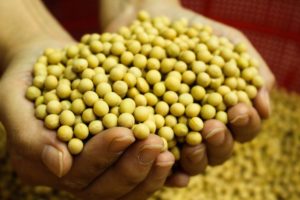
The mixture is boiled and stirred, which improves the nutritional value, as well as the taste. Finally, the mixture is filtered to remove any chunks or larger bits and produce a consistent liquid that looks a lot like dairy milk.
It is at this point that you can add flavors to the milk, for example, vanilla. Many companies also fortify soy milk with Vitamin B12, which is only found in animal products. This helps vegans achieve their Vitamin B12 requirement.
Today, there are many companies, both local and global, producing soy milk. Most of the products you’ll see in vegan stores or even regular supermarkets are organic. In other words, most soy milk products are free from additives or any potentially harmful ingredients.
Benefits of Soy Milk
The good news is that soy milk isn’t merely a milk alternative for lactose intolerant or vegans; it’s actually quite healthy. As the study mentioned earlier affirms, soy milk may just be the healthiest of all the plant-based milk options out there.
Here are some of the many benefits it offers:
Healthy Source of Protein
Of all the plant-based milk alternatives, soy milk is the closest to cow milk in terms of protein. In fact, it contains as much protein as cow’s milk. An 8-ounce serving of soy milk contains 7 to 12 grams of protein.
Soy, as you know, is a healthy and clean source of protein, popular among vegans and plant-based consumers. It contains all the nine essential amino acids, which normally only animal protein like meat offers.
Low in Saturated Fats
As soy milk is plant-based, it’s naturally free from saturated fats. That makes it a lot safer and healthier than whole milk, which does contain a decent amount of fat.
Lowers Cholesterol
Although soybean’s relationship with heart health is a hotly debated topic, much evidence suggests that its heart-healthy as it helps lower cholesterol levels. A meta-analysis of 46 trials published in the Journal of Nutrition found that soy protein helped lower LDL cholesterol (bad cholesterol). The study found that 25 g of soy protein daily leads to a 3-4 percent reduction in LDL levels in men with already higher cholesterol levels.
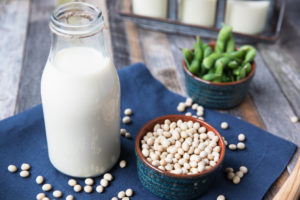
Contains Isoflavones
Aside from the necessary nutrients, soy milk also contains phytonutrients called isoflavones. Isoflavones have long been linked with a reduction in the risk of cancer.
A paper published in Medicines explored many existing studies, both animal and clinical, about isoflavones and breast cancer. It notes that isoflavones have both estrogenic and antiestrogenic properties. The latter may help reduce the risk of breast cancer as well as the risk of reoccurrence in survivors.
Low in Calories
While soy milk has as much protein as dairy but it doesn’t have as many calories. That’s quite a catch!
A hundred grams of soy milk contains 54 kcal, whereas whole milk contains 61 kcal. So if you’re trying to lose weight and watching your calorie intake, soy milk can be a good option for your coffee and cereal.
Omega 3 Fatty Acids
Soy milk contains all essential omegas, including omega 3 fatty acids. These fatty acids are incredibly important for brain health, as our bodies don’t produce our own. Regular intake of omega 3 fatty acids can slow down age-related cognitive decline and reduce the risk of Alzheimer’s disease.
Good Source of Minerals and Vitamins
Soy milk itself is a decent source of Vitamin A, B, and many minerals, including calcium and potassium. However, many times its fortified with vitamins and minerals, particularly calcium and Vitamin D.
Therefore, the nutritional content increases, making soy milk just as nutritionally balanced as regular cow milk. Many experts say that cow milk is the most well-rounded nutrients-wise, but soy milk is no different.
Is Soy Milk Safe?
The isoflavones in soy milk have been associated with a higher risk of cancer in some research, whereas other studies have contradicted that. Most of the scientific evidence suggests that soy milk is completely safe for consumption.
For one, the studies suggesting the harmful effect of isoflavones were conducted on rats. Plus, the amount of soy milk that was fed them was higher than what you would consume on average in a day.
And with so many benefits to offer, soy milk is as safe as it gets.
However, people can be allergic to soy, in which case, you should use other plant-based milk alternatives. Soy allergy often occurs in infancy. Although rarely is it life-threatening, if you do have soy allergies, it’s best to avoid soy milk altogether, as well as any other soy products.
Other Plant-based Milk Alternatives
If you have a soy allergy or perhaps you don’t like the nutty taste of soy milk, there are other healthy plant milk alternatives as well:
Almond Milk
Almond milk is made with almonds, which gives them a nutty, slightly sweet flavor. It’s not as rich in protein as soy milk. Almonds themselves are a good source of protein, though, but they lose some of that content when grounded into milk.
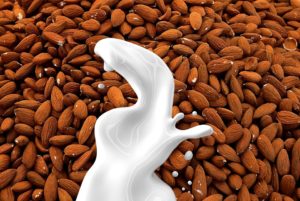
It has very low calories, which makes it a great option for those trying to lose weight. There are just 36 calories in one serving. This plant-based milk also contains monosaturated fats, which aren’t unhealthy.
Much like soy milk, almond milk products are also fortified with vitamins and minerals to make it more nutritionally high value.
Coconut Milk
Coconut milk is very popular in different cuisines and can be a great alternative for dishes that use cow milk. However, you can drink it as a beverage. It’s made from coconut cream, which, in turn, comes from mature coconuts.
There are varieties of coconut milk, as some are more diluted and meant for use in beverages.
Oat Milk
While you can find oat milk at stores, it’s pretty easy to make your own. It’s pretty much just blended oats in water that are filtered to get rid of the oat particles. It has a very mild oat taste and is best for your coffee or oatmeal (to double down on that fiber content).
Oats are extremely healthy for your heart, as they help lower blood sugar and may even help with hypertension. It can also help with lowering bad cholesterol, according to this American Journal of Clinical Nutrition study.
Wrap Up
So is soy milk good for lactose intolerance? By every account! Not only does it help take care of lactose intolerance but it’s also good for your health. Even if you’re not lactose intolerant, you should start having soy milk.
While there are many brands and products of soy milk, 365 Organic Unsweetened Soymilk and Silk Organic Soymilk are the best. If you want something more flavorful, go for Silk Vanilla Soymilk.
